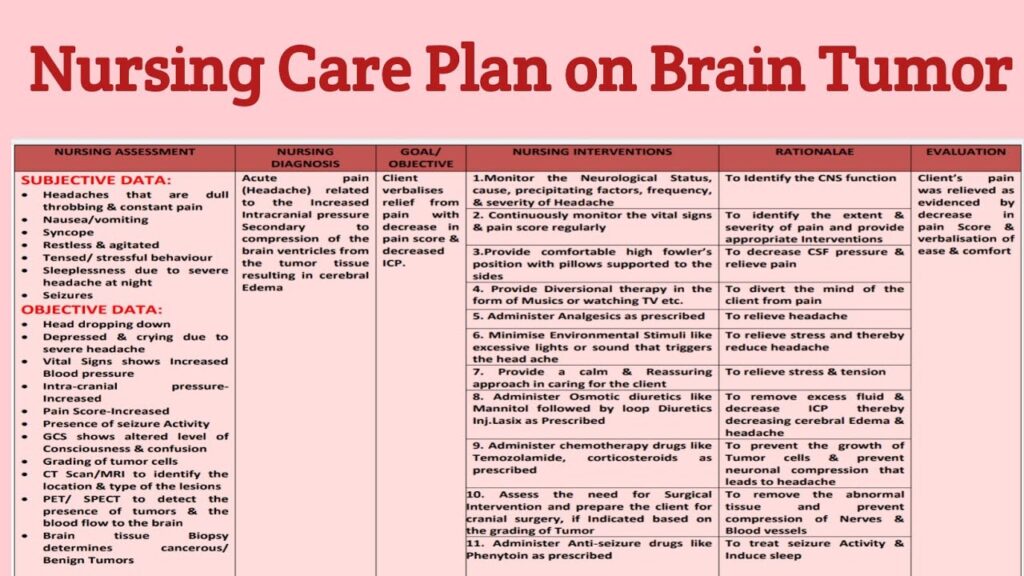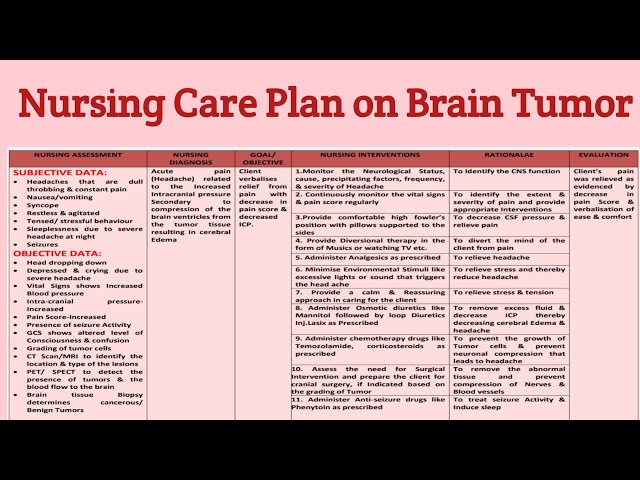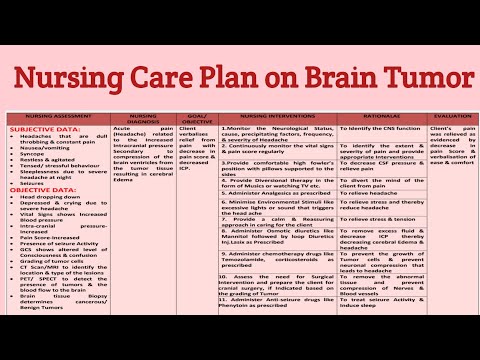In this article, you will discover important nursing considerations and management strategies for patients diagnosed with meningioma. As a nurse, it is vital to be well-informed about the specific care needs and potential complications associated with this type of brain tumor. By understanding the unique challenges faced by meningioma patients, you can play a crucial role in helping them navigate their treatment journeys with comfort and support. From monitoring symptoms to providing emotional care, join us as we explore the essential aspects of nursing care for individuals living with meningioma.

Preoperative Care
Assessment and Monitoring
In the preoperative phase of care for meningioma patients, it is crucial to conduct a thorough assessment and monitoring of the patient’s overall health. This includes taking a detailed medical history, performing a physical examination, and ordering relevant diagnostic tests. The aim is to identify any comorbidities or contraindications that may affect the surgical procedure or anesthesia administration. Close monitoring of vital signs such as blood pressure, heart rate, respiratory rate, and temperature is essential to ensure the patient’s stability before surgery.
Educating the Patient
Education plays a vital role in preparing the patient for surgery. It is important to provide clear and concise information about the surgical procedure, potential risks and complications, and what to expect during the recovery period. This includes explaining the need for preoperative fasting, the use of prophylactic antibiotics, and any specific preoperative preparations such as bowel preparation. Additionally, it is crucial to address the patient’s concerns, provide emotional support, and answer any questions they may have.
Preparing for Surgery
The preoperative period is a time for meticulous preparation to ensure a safe and efficient surgical procedure. This includes ensuring that the patient has properly followed fasting guidelines and has removed any jewelry or other objects that may interfere with the surgery. The nursing team works closely with the surgical team to coordinate the administration of medication, prophylactic antibiotics, and any additional preoperative interventions. This may also involve obtaining consent for the surgery and ensuring all necessary documentation is completed.
Intraoperative Care
Anesthesia Management
During the intraoperative phase, anesthesia management is crucial for the patient’s comfort and safety. The anesthesiologist plays a key role in administering and monitoring anesthesia, taking into consideration the patient’s age, comorbidities, and the surgical procedure. It is important to maintain a balance between providing adequate anesthesia to ensure the patient remains unconscious and pain-free, while also monitoring their vital signs closely to prevent any adverse reactions or complications.
Positioning and Safety
Proper positioning of the patient during surgery is essential to optimize surgical access and prevent complications such as pressure ulcers, nerve injuries, or circulatory problems. The nursing team works closely with the surgical team to ensure the patient is positioned correctly and maintained in a stable position throughout the procedure. This may involve using specialized equipment such as foam padding, pillows, or surgical positioning devices. Attention to safety measures such as securing tubes and lines, ensuring the patient’s limbs are protected, and maintaining a sterile environment is vital.
Monitoring Vital Signs
Continuous monitoring of vital signs during surgery is critical to detect any changes in the patient’s condition promptly. This includes monitoring blood pressure, heart rate, respiratory rate, oxygen saturation levels, and end-tidal carbon dioxide levels. The nursing team collaborates closely with the anesthesiologist to ensure the patient’s vital signs remain within normal limits throughout the procedure. Any fluctuations or abnormalities are documented and communicated to the surgical team for appropriate intervention.
Assisting the Surgeon
Nurses play a vital role in assisting the surgeon during the intraoperative phase. This may include passing surgical instruments, sutures, or assisting with wound closure. It is imperative for the nurse to remain vigilant and anticipate the surgeon’s needs to ensure a smooth and efficient procedure. Moreover, the nurse must maintain a sterile environment, monitor the patient’s condition closely, and communicate any changes or concerns to the surgical team promptly.
Postoperative Care
Monitoring Neurological Status
After meningioma surgery, close monitoring of the patient’s neurological status is vital. This includes assessing the patient’s level of consciousness, motor function, and specific neurological deficits. Frequent neurological assessments are performed to detect any changes or complications such as seizures, altered mental status, or motor deficits. The nursing team collaborates closely with the healthcare provider to promptly intervene and manage any neurological changes to optimize the patient’s recovery.
Pain Management
Effective pain management is crucial in the postoperative period to ensure the patient’s comfort and well-being. The nursing team works collaboratively with the healthcare provider to assess the patient’s pain level, administer appropriate analgesics, and monitor the effectiveness of pain control. This may include the use of oral or intravenous pain medications, patient-controlled analgesia (PCA), or non-pharmacologic interventions such as relaxation techniques or moist heat application. Regular reassessment is essential to ensure optimal pain relief and prevent complications associated with undertreated pain.
Fluid and Electrolyte Balance
Maintaining adequate fluid and electrolyte balance is essential in the postoperative care of meningioma patients. The nursing team closely monitors the patient’s fluid intake and output, including urine output, to ensure proper hydration and prevent any imbalances. Intravenous fluids may be administered as prescribed to maintain fluid balance. Electrolyte levels are also regularly monitored, and any abnormalities are promptly addressed through appropriate interventions such as electrolyte replacement or adjustments in intravenous fluids.
Preventing Complications
Prevention of complications is a priority in the postoperative care of meningioma patients. Close monitoring for any signs of infection, bleeding, or thromboembolism is essential. This involves conducting thorough assessments, monitoring vital signs, and regularly inspecting the surgical incision site for any signs of infection or dehiscence. Appropriate wound care, including dressing changes and infection control measures, is implemented. The nursing team also educates the patient and family about signs and symptoms of complications, and when to seek medical attention.
Neurological Assessment
Cognitive Function
Assessing cognitive function is an integral part of the neurological assessment for meningioma patients. The nursing team evaluates the patient’s orientation to time, place, and person, as well as their attention span, memory, and language skills. Any deficits or changes in cognitive function are carefully documented and communicated to the healthcare provider for further evaluation and intervention. Rehabilitation strategies may be implemented to help the patient regain cognitive abilities and optimize their overall functioning.
Cranial Nerve Evaluation
Evaluation of cranial nerve function is essential in assessing potential neurological deficits following meningioma surgery. The nursing team assesses each cranial nerve individually, including visual acuity, pupillary reactions, facial symmetry, hearing, smell, taste, and swallowing function. Any abnormalities or changes in cranial nerve function are promptly reported to the healthcare provider for further evaluation and intervention. Rehabilitation techniques may be utilized to address any deficits and improve cranial nerve function.
Motor Function
Motor function assessment is crucial in evaluating the patient’s ability to move and control their muscles following meningioma surgery. The nursing team assesses muscle strength, coordination, and balance, as well as the patient’s ability to perform activities of daily living. Any motor deficits or weakness are documented and communicated to the healthcare provider for assessment and possible intervention. Physical therapy may be initiated to promote optimal motor function and enhance the patient’s overall mobility.
Sensory Function
Assessment of sensory function is an important component of the neurological assessment in meningioma patients. The nursing team evaluates the patient’s ability to perceive touch, pain, temperature, and proprioception. Any sensory deficits or abnormalities are carefully documented and reported to the healthcare provider for further evaluation and intervention. Occupational therapy may be initiated to help the patient adapt to any sensory changes and optimize their independent functioning.

Steroid Therapy
Administration and Dosage
Steroid therapy is often used in the management of meningioma to reduce cerebral edema and control symptoms. The nursing team collaborates with the healthcare provider to ensure accurate administration and dosage of steroids. This may involve administering oral or intravenous steroids as prescribed, following the specific medication schedule, and monitoring the patient’s response to therapy. Proper documentation of dosage and administration times is crucial to ensure continuity of care and adherence to the prescribed therapy.
Monitoring for Side Effects
Steroid therapy can be associated with various side effects that need to be closely monitored. The nursing team assesses the patient for common side effects such as hyperglycemia, fluid and electrolyte imbalances, gastrointestinal disturbances, and mood changes. Regular monitoring of blood glucose levels, fluid intake and output, and electrolyte levels is essential. Any side effects are promptly documented and reported to the healthcare provider for further management and adjustment of therapy if necessary.
Patient Education
Patient education is crucial in ensuring the patient’s understanding and adherence to steroid therapy. The nursing team provides clear and concise information about the purpose of steroid therapy, potential side effects, and the importance of following the prescribed medication schedule. Emphasizing the need for regular follow-up appointments, laboratory tests, and reporting of any concerning symptoms is important to optimize the patient’s response to therapy. Additionally, the nurse addresses any concerns or questions the patient may have to promote their overall well-being.
Radiation Therapy
Assessment of Radiation Effects
Radiation therapy is a common treatment modality for meningioma patients. The nursing team performs ongoing assessments to evaluate the patient’s response to radiation and monitor for any adverse effects. This includes assessing the skin for radiation dermatitis, monitoring for changes in hair texture or loss, and evaluating for signs of fatigue or other systemic reactions. Close monitoring of the patient’s overall well-being, including any psychological or emotional changes, is also important during this phase of treatment.
Skin Care
Proper skin care is essential in managing radiation-induced skin changes in meningioma patients. The nursing team educates the patient on the importance of gentle skin cleansing, avoiding harsh chemicals or irritants, and maintaining good hygiene. Applying recommended emollients or barrier creams can help alleviate dryness and discomfort. Regular assessment of the skin for signs of erythema, desquamation, or ulceration is crucial, and any abnormalities are promptly reported to the healthcare provider for further evaluation and intervention.
Nutritional Support
Radiation therapy can often result in changes in appetite, taste, and nutritional status in meningioma patients. The nursing team collaborates with the healthcare provider and a registered dietitian to assess the patient’s nutritional needs and provide appropriate support. This may include recommending a well-balanced diet, modification of food textures for swallowing difficulties, or the use of nutritional supplements as needed. Regular monitoring of the patient’s weight, hydration status, and nutritional intake is important to ensure optimal nutritional support throughout the radiation therapy process.

Chemotherapy
Administration and Monitoring
Chemotherapy may be indicated in certain cases of meningioma, either as an adjuvant therapy or for recurrent or metastatic disease. The nursing team works closely with the healthcare provider to administer chemotherapy agents as prescribed and monitor the patient’s response to treatment. This may involve IV administration of chemotherapy drugs, monitoring parameters such as blood counts and organ function, and managing any infusion-related reactions or side effects. Appropriate documentation and communication of any changes or concerns are essential to ensure continuous and effective care.
Management of Side Effects
Chemotherapy can be associated with various side effects that require close management and support. The nursing team provides education and support to the patient regarding potential side effects such as nausea, vomiting, hair loss, fatigue, or mucositis. Implementation of antiemetic medications, oral hygiene measures, and strategies to manage fatigue can greatly improve the patient’s quality of life during chemotherapy. Regular assessment of the patient’s overall well-being and prompt intervention for any side effects help to optimize the patient’s response to treatment.
Psychosocial Support
Chemotherapy treatment can be emotionally and psychologically challenging for meningioma patients. The nursing team plays a crucial role in providing emotional support, addressing fears and concerns, and connecting the patient with appropriate resources. This may include counseling services, support groups, or referral to a social worker who can assist with financial or logistical challenges. Creating a supportive and empathetic environment is important in promoting the patient’s overall well-being and mental health throughout the chemotherapy treatment process.
Palliative Care
Symptom Management
Palliative care focuses on managing symptoms and improving the quality of life for meningioma patients with advanced or incurable disease. The nursing team collaborates with the healthcare provider to assess and manage symptoms such as pain, nausea, dyspnea, or psychological distress. This may involve the administration of appropriate medications, implementing non-pharmacologic interventions, and providing emotional support. Regular assessment and reassessment of symptoms are essential to ensure optimal symptom management and comfort for the patient.
Psychological Support
Meningioma patients receiving palliative care often require psychological support to cope with the challenges associated with their illness. The nursing team plays a vital role in providing emotional support, active listening, and empathy. They address the patient’s fears, concerns, and anxieties, and encourage open communication. Referral to a psychologist or psychiatrist may be made for more specialized counseling or therapy. Ensuring the patient’s psychological well-being is essential in providing holistic care and promoting a sense of comfort and peace.
End-of-Life Care
In the final stages of meningioma, end-of-life care becomes a priority. The nursing team works closely with the healthcare provider and palliative care team to ensure the patient’s comfort, dignity, and emotional support during this difficult time. This may involve managing symptoms such as pain or dyspnea, providing psychosocial support to the patient and their family, facilitating advanced care planning, and coordinating necessary resources such as home hospice services. The nursing team plays a crucial role in advocating for the patient’s wishes and ensuring a peaceful and meaningful end-of-life journey.

Rehabilitation and Recovery
Physical Therapy
Physical therapy plays a crucial role in the rehabilitation and recovery of meningioma patients. The nursing team collaborates with the physical therapist to assess the patient’s mobility, strength, and balance, and develop a customized exercise plan. This may include therapeutic exercises, gait training, or utilization of assistive devices if needed. Regular sessions with the physical therapist, combined with ongoing monitoring and support from the nursing team, help the patient regain functional independence and optimize their overall physical well-being.
Occupational Therapy
Occupational therapy focuses on helping meningioma patients regain independence in performing activities of daily living. The nursing team works closely with the occupational therapist to assess the patient’s functional abilities and develop strategies to enhance their self-care skills, such as dressing, bathing, or meal preparation. The nurse provides ongoing support and reinforcement of occupational therapy goals, ensuring the patient’s environment is safe and facilitating necessary adaptations or assistive devices as needed.
Speech Therapy
Speech therapy is often required for meningioma patients experiencing speech or swallowing difficulties. The nursing team collaborates with the speech therapist to evaluate the patient’s speech, language, and swallowing function. Implementing swallowing strategies, speech exercises, and facilitating communication aids can greatly improve the patient’s quality of life. The nurse provides ongoing support and reinforcement of speech therapy goals, ensuring the patient’s nutritional status and facilitating effective communication.
Supportive Devices
Supportive devices play a crucial role in facilitating rehabilitation and recovery for meningioma patients. The nursing team works closely with the healthcare provider and rehabilitation specialists to assess the patient’s needs and provide appropriate assistive devices. This may include mobility aids such as walkers or canes, orthotic devices, communication aids, or adaptive equipment for activities of daily living. The nurse ensures the proper fitting and utilization of supportive devices, and provides education and ongoing support to the patient and their family.
Patient Education
Understanding the Disease
Patient education is essential in helping meningioma patients understand their condition and make informed decisions about their care. The nursing team provides clear and accurate information about the nature of meningioma, its potential causes, and treatment options available. They explain the importance of regular follow-up appointments, imaging studies, and any necessary laboratory tests. The nurse addresses the patient’s concerns, fears, and questions, ensuring they have a comprehensive understanding of their disease and the rationale behind their care plan.
Managing Symptoms
Empowering meningioma patients to manage their symptoms is a vital component of patient education. The nursing team provides education on self-care strategies to alleviate common symptoms such as pain, nausea, fatigue, or changes in cognition. This may include teaching relaxation techniques, providing education on medication management, or referrals to complementary therapies such as acupuncture or massage. By equipping patients with the necessary knowledge and skills, they can actively participate in their own symptom management and overall well-being.
Medication Adherence
Medication adherence is crucial in optimizing treatment outcomes for meningioma patients. The nursing team plays a key role in educating patients about their prescribed medications, including the purpose, dosage, and potential side effects. They provide clear instructions on how to take medications correctly and emphasize the importance of adherence. The nurse addresses any concerns or barriers to medication adherence, such as medication cost or difficulty with administration, and collaborates with the healthcare provider to explore solutions or alternatives if needed.
Follow-up Care and Surveillance
Follow-up care and surveillance are critical in monitoring the progress and detecting any potential recurrence or complications in meningioma patients. The nursing team educates the patient on the importance of regular follow-up appointments, imaging studies, and laboratory tests. They provide information about signs and symptoms that require immediate medical attention and address any concerns or questions the patient may have. By emphasizing the significance of ongoing surveillance, the nurse helps to ensure early detection and intervention, promoting optimal long-term outcomes for the patient.
In conclusion, nursing considerations for meningioma encompass comprehensive care throughout the entire treatment journey. From the preoperative phase to postoperative care, neurological assessment to supportive therapies, nurses play a crucial role in assessing and managing patients with meningioma. Through education, close monitoring, and collaboration with the healthcare team, nurses can optimize patient outcomes, provide emotional support, and facilitate a safe and effective recovery process.
